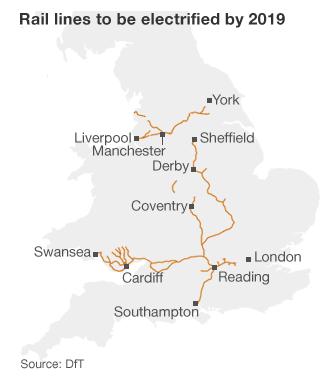A £9.4bn package of investment in the railways in England and Wales, including £4.2bn of new schemes, has been unveiled by the government. The plans include electrification of the Midland Main Line between Bedford and Sheffield. Other rail improvements have been unveiled for the Manchester area, South Wales and the East Coast Main Line.
Prime Minister electrification called it the "biggest modernisation of our railways since the Victorian era". During a visit to Birmingham to announce the railway investment, the PM said it would lead to the electrification of an extra 850 miles of track. He said: "This investment will mean faster journeys, more seats, better access to stations, greater freight links and a truly world-class rail network." Deputy Prime Minister Nick Clegg, who joined the PM on the visit, said the plans would help "close the north south divide".
It includes £5.2bn for the completion of current schemes, such as 'Crossrail' and 'Thameslink' and £4.2bn for new projects.
These include:-

An £800m electrification and upgrade from Sheffield to Bedford, completing the full electrification of the Midland Main Line.
Electrification extended from Cardiff to Swansea, costing £600m, plus electrification of the Welsh valley lines.
The Northern Hub - a series of projects around Manchester worth £322m that improve northern rail capacity to get more and faster trains across the north of England.
Upgrades to the East Coast Main Line from London to Leeds and Newcastle worth £240m to create faster journeys and increase capacity.
Upgrades to stations and tracks creating capacity for an additional 140,000 daily rail commutes around cities at peak times, including £350m for lengthening platforms at London's Waterloo station.
A new £500m rail link between the Great Western Main Line and Heathrow.
Building work on the rail projects will not start until at least 2014, as the announcement covers the period 2014 to 2019.
The government said it would be funded "in part from fare rises already announced in 2010 and also from the substantial efficiency savings, which projects like electrification will have on the long-term operating costs of the railways". In January 2012, passengers faced average increases of RPI inflation plus 1% on regulated fares, which are set to rise by RPI plus 3% in January 2013 and 14.
Transport Secretary Justine Greening told BBC Radio 4's Today programme the government had a long-term plan to make the rail industry work more efficiently and stop the above-inflation fare rises. "We've got to get the money from somewhere so, for the time being, the passengers are paying," she said. "We all know that diesel is massively expensive so if we can move over to electric trains, not only are they greener, they're also cheaper and also they are lighter too, so what that means is that when they are on the track they don't damage it so much, so maintenance costs go down too," she added. Regarding access to the rail network, she later told Parliament she was initially making £20m available for Network Rail to invite bids for new stations.
Webmaster's Comment: If it is greener and cheaper then all well and good but if its motivation is also the pursuit of even speedier journeys then, as someone who regards speeds of greater than 3½mph as unseemly (see my webmaster's page for the reason) then I'm sure I could find a good alternative use for the 9.4 billion pounds! The 2015 government budget will have put some of above proposals on hold.
